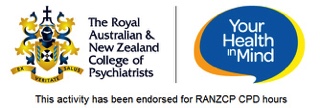Course Description
Navigating Risk - Empowering Recovery is a breakthrough course tailored specifically to the trending challenges experienced by practitioners in embracing a recovery focused approach to mental health work. This includes facing difficult and complex risk scenarios and medico-legal challenges utilising 'Values Based Practice' principles.
Drawing upon the latest evidence base this course delivers practical and applied learnings to practitioners equipping them with improved knowledge, critical insights and a solid learning platform on which to build their skills and confidence.
The micro-course is broken down into 3 carefully crafted and paced sessions; Challenges to Safety, Enabling Understanding, Enabling Collaboration, providing participants with a unique and engaging online experience unlike any other in the field. This involves:
- presented slides (screencasts)
- facilitated video examples
- key reflections and discussions
- practice tips
- reflective questions
- strategic tools and
- easy to use resources for you to download and utilise as needed.
Learning objectives
On completion of this course, you will be able to:
-apply risk assessment research findings to your practice
-understand the role of ‘risk factors’ and ‘protective factors’ when working with risk
-assist clients at risk of serious harm, by way of structured, evidence-based analysis of past behaviours
With a 30 day money back guarantee, there is no risk to you or your organisation. Register now and find out why this course offers a breakthrough in negotiating challenging risk scenarios whilst maintaining a truly recovery focused approach.

"The important thing is not to stop questioning. Curiosity has its own reason for existing." Albert Einstein
Course curriculum
-
1
Challenges To Safety - the role of risk
-
2
Enabling Understanding - the role of information
-
NRER 2 - Enhancing Understanding
-
NRER Session 2.Handout
-
-
3
Enabling Action - the role of collaboration
-
NRER Session 3 - Enhancing collaboration
-
NRER Session 3.Handout
-
Risk Action Plan Summary
-
Risk factors and Protective factors
-
NRER Bibliography
-
Fundamentals of Risk: MCQs
-
NRER Further Reading
-
Forensic Consultant Psychiatrist
Andrew Carroll
Co Director
Brett Bridges
